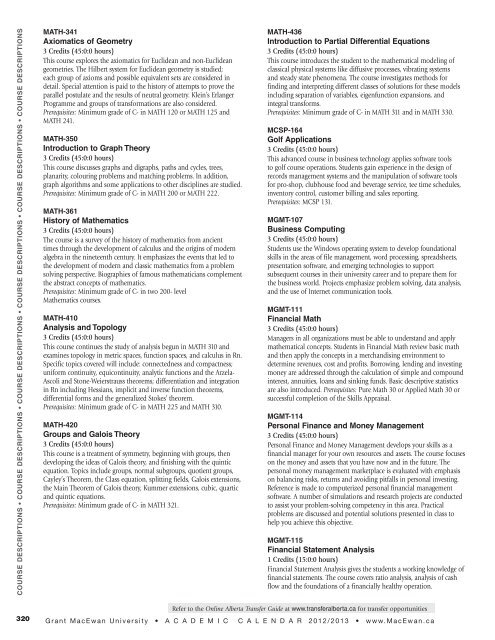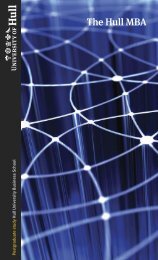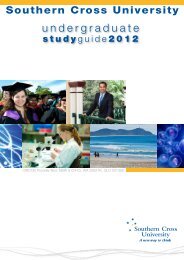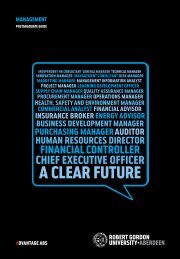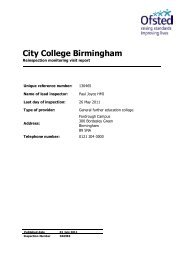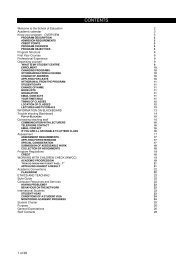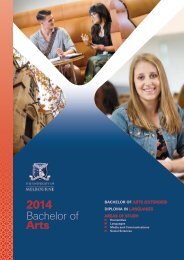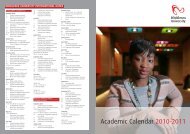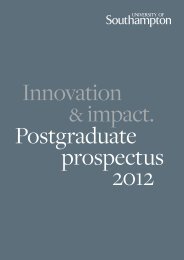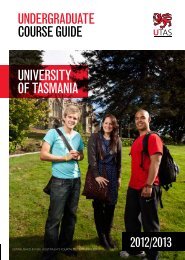Academic Calendar 2012/2013
Academic Calendar 2012/2013
Academic Calendar 2012/2013
Create successful ePaper yourself
Turn your PDF publications into a flip-book with our unique Google optimized e-Paper software.
course Descriptions • course Descriptions • course Descriptions • course Descriptions • course Descriptions • course DescriptionsMATH-341Axiomatics of Geometry3 Credits (45:0:0 hours)This course explores the axiomatics for Euclidean and non-Euclideangeometries. The Hilbert system for Euclidean geometry is studied;each group of axioms and possible equivalent sets are considered indetail. Special attention is paid to the history of attempts to prove theparallel postulate and the results of neutral geometry. Klein’s ErlangerProgramme and groups of transformations are also considered.Prerequisites: Minimum grade of C- in MATH 120 or MATH 125 andMATH 241.MATH-350Introduction to Graph Theory3 Credits (45:0:0 hours)This course discusses graphs and digraphs, paths and cycles, trees,planarity, colouring problems and matching problems. In addition,graph algorithms and some applications to other disciplines are studied.Prerequisites: Minimum grade of C- in MATH 200 or MATH 222.MATH-361History of Mathematics3 Credits (45:0:0 hours)The course is a survey of the history of mathematics from ancienttimes through the development of calculus and the origins of modernalgebra in the nineteenth century. It emphasizes the events that led tothe development of modern and classic mathematics from a problemsolving perspective. Biographies of famous mathematicians complementthe abstract concepts of mathematics.Prerequisites: Minimum grade of C- in two 200- levelMathematics courses.MATH-410Analysis and Topology3 Credits (45:0:0 hours)This course continues the study of analysis begun in MATH 310 andexamines topology in metric spaces, function spaces, and calculus in Rn.Specific topics covered will include: connectedness and compactness;uniform continuity, equicontinuity, analytic functions and the Arzela-Ascoli and Stone-Weierstrauss theorems; differentiation and integrationin Rn including Hessians, implicit and inverse function theorems,differential forms and the generalized Stokes’ theorem.Prerequisites: Minimum grade of C- in MATH 225 and MATH 310.MATH-420Groups and Galois Theory3 Credits (45:0:0 hours)This course is a treatment of symmetry, beginning with groups, thendeveloping the ideas of Galois theory, and finishing with the quinticequation. Topics include groups, normal subgroups, quotient groups,Cayley’s Theorem, the Class equation, splitting fields, Galois extensions,the Main Theorem of Galois theory, Kummer extensions, cubic, quarticand quintic equations.Prerequisites: Minimum grade of C- in MATH 321.MATH-436Introduction to Partial Differential Equations3 Credits (45:0:0 hours)This course introduces the student to the mathematical modeling ofclassical physical systems like diffusive processes, vibrating systemsand steady state phenomena. The course investigates methods forfinding and interpreting different classes of solutions for these modelsincluding separation of variables, eigenfunction expansions, andintegral transforms.Prerequisites: Minimum grade of C- in MATH 311 and in MATH 330.MCSP-164Golf Applications3 Credits (45:0:0 hours)This advanced course in business technology applies software toolsto golf course operations. Students gain experience in the design ofrecords management systems and the manipulation of software toolsfor pro-shop, clubhouse food and beverage service, tee time schedules,inventory control, customer billing and sales reporting.Prerequisites: MCSP 131.MGMT-107Business Computing3 Credits (45:0:0 hours)Students use the Windows operating system to develop foundationalskills in the areas of file management, word processing, spreadsheets,presentation software, and emerging technologies to supportsubsequent courses in their university career and to prepare them forthe business world. Projects emphasize problem solving, data analysis,and the use of Internet communication tools.MGMT-111Financial Math3 Credits (45:0:0 hours)Managers in all organizations must be able to understand and applymathematical concepts. Students in Financial Math review basic mathand then apply the concepts in a merchandising environment todetermine revenues, cost and profits. Borrowing, lending and investingmoney are addressed through the calculation of simple and compoundinterest, annuities, loans and sinking funds. Basic descriptive statisticsare also introduced. Prerequisites: Pure Math 30 or Applied Math 30 orsuccessful completion of the Skills Appraisal.MGMT-114Personal Finance and Money Management3 Credits (45:0:0 hours)Personal Finance and Money Management develops your skills as afinancial manager for your own resources and assets. The course focuseson the money and assets that you have now and in the future. Thepersonal money management marketplace is evaluated with emphasison balancing risks, returns and avoiding pitfalls in personal investing.Reference is made to computerized personal financial managementsoftware. A number of simulations and research projects are conductedto assist your problem-solving competency in this area. Practicalproblems are discussed and potential solutions presented in class tohelp you achieve this objective.MGMT-115Financial Statement Analysis1 Credits (15:0:0 hours)Financial Statement Analysis gives the students a working knowledge offinancial statements. The course covers ratio analysis, analysis of cashflow and the foundations of a financially healthy operation.320Grant MacEwan University • A C A D E m I CRefer to the Online Alberta Transfer Guide at www.transferalberta.ca for transfer opportunitiesC A L E N D A R <strong>2012</strong>/<strong>2013</strong> • www.MacEwan.ca


